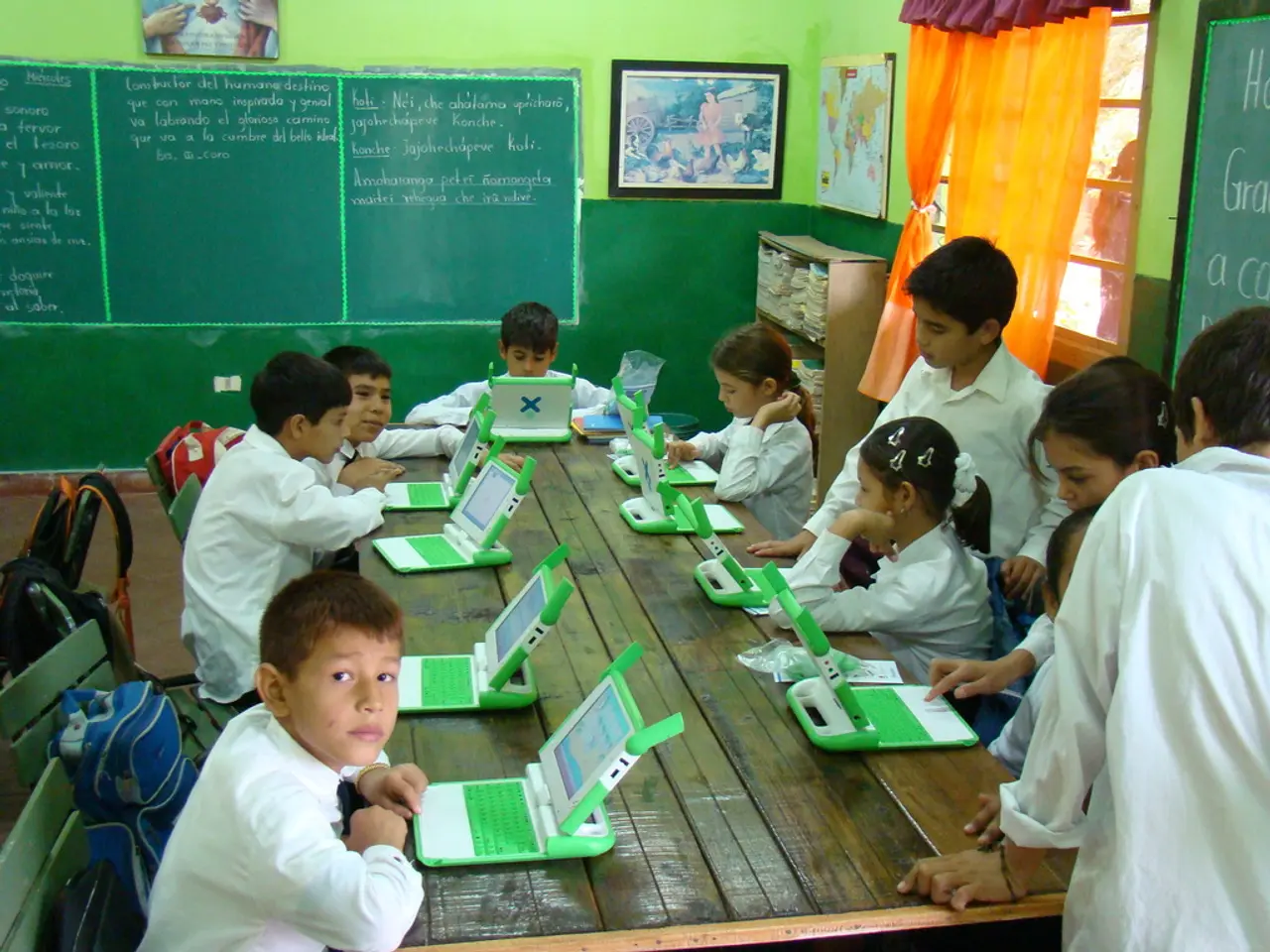Majority of parents endorse school phone bans
================================================================================
In a recent poll, the "Digital Study 2025" revealed that 80% of parents support a cell phone ban at schools, with 49% of respondents with children believing smartphones disrupt learning and concentration [1]. However, the German Teachers' Association and the association's president, Stefan Dull, advocate for a more nuanced approach.
Dull proposes a "critical-reflective" approach to phone use, emphasizing the need to teach young people responsible digital media use rather than a complete ban [2]. He acknowledges the high distraction potential of smartphones, even for adults, but argues that a blanket ban may make secret use more appealing [3].
Dull supports clear school rules, including banning private phone use during class, but does not advocate for a complete ban. He suggests schools should guide digital media use to help children and young people use digital media and social networks responsibly [2].
The arguments for a complete cell phone ban in schools focus on reducing distractions, improving student attention and academic performance, protecting student mental health, and minimizing cyberbullying and cheating. Schools that have implemented bans, including many U.S. states and countries like the Netherlands, report benefits such as increased concentration, more social interaction, and potentially better grades [1][2][3].
However, opponents argue that banning phones is not a straightforward solution and may not effectively address mental health issues, cyberbullying, or academic problems. Some findings suggest that students without phones during school hours could actually experience higher levels of depression [1]. There is also concern that cyberbullying can persist or even worsen in these settings, possibly because schools facing such issues are more likely to impose bans [1].
Regarding perspectives by different age groups, parents, and teachers, research indicates mixed effects. Younger students, for example, might show better grades without phones but potentially more depression symptoms in banned environments [1]. Parents' views often vary depending on concerns about distraction versus safety and communication. Some parents appreciate bans for promoting focus and reducing anxiety, while others worry about restricted communication and reduced access to learning tools [2].
Teachers generally favor bans or restrictions because phones can cause classroom disruptions, cheating, and diminished face-to-face interaction. However, some suggest allowing phones with clear guidelines, pointing out that outright bans may be difficult to enforce and that tailored classroom rules work better [2][3].
The debate involves balancing benefits like improved attention and safety against drawbacks such as potential negative mental health impacts and challenges in effective enforcement. Views differ by stakeholder group, and evidence suggests that nuanced policies rather than outright bans may be more effective in some cases [1][2][3].
The poll was commissioned by Postbank and involved online surveys of 3,050 residents between May and June, of which 805 were parents. Previous polls have shown that parents don't like smartphones at schools, and this issue doesn't seem to be generational, as both older and younger parents agree on the disruption caused by smartphones [1].
In June, a ban on the use of private smartphones and smartwatches was implemented in the Saarland state [4]. Schools in Mecklenburg-Vorpommern will also set their own rules regarding cell phone usage. North Rhine-Westphalia schools are required to establish age-appropriate rules for phone use by autumn [5]. The "Leisure Monitor 2025" study confirms that many Germans spend a lot of time on their phones and online, including parents [6].
References:
[1] ntv.de. (2021, July 20). Smartphones in School: 80% of Parents Want a Ban. Retrieved from https://www.ntv.de/wissenschaft/Smartphones-im-Schulraum-80-Prozent-der-Eltern-wollen-einen-Verbot-article22839573.html
[2] dpa. (2021, July 21). Smartphones in School: Parents and Teachers Disagree on Ban. Retrieved from https://www.tagesspiegel.de/wissenschaft/smartphones-im-schulraum-eltern-und-lehrer-streiten-uber-verbot-article26484924
[3] DW.com. (2021, July 19). Smartphones in School: The Case for and Against a Ban. Retrieved from https://www.dw.com/en/smartphones-in-school-the-case-for-and-against-a-ban/a-58801180
[4] ntv.de. (2021, June 29). Smartphones and Smartwatches Banned in Saarland Schools. Retrieved from https://www.ntv.de/nachrichten/Saarland-Schulen-Smartphones-und-Smartwatches-verboten-article22794379.html
[5] n-tv.de. (2021, July 20). North Rhine-Westphalia: Schools Must Establish Phone Rules by Autumn. Retrieved from https://www.n-tv.de/politik/Nordrhein-Westfalen-Schulen-mussen-bis-Herbst-Telefonregeln-einrichten-article22839627.html
[6] DW.com. (2021, July 21). Many Germans Spend a Lot of Time on Their Phones and Online, Including Parents. Retrieved from https://www.dw.com/en/many-germans-spend-a-lot-of-time-on-their-phones-and-online-including-parents/a-58804091
- The German Teachers' Association, led by Stefan Dull, advocates a "critical-reflective" approach to digital media use in schools, which includes promoting vocational training in responsible digital media use as part of education-and-self-development programs.
- Schools that have successfully implemented clear community policies on responsible smartphone usage, such as banning private phone use during class and guiding digital media use, have reported benefits like increased concentration, more social interaction, and potentially better grades, thus supporting the importance of education-and-self-development in vocational training on responsible phone usage.




